My Lucky Stars, Twinkle Twinkle Lucky Stars, Winners and Sinners (1983, 1985)
Directed by: Sammo Hung
Written by: Barry Wong, Sammo Hung
Starring: Charlie Chin, Eric Tsang, Jackie Chan, John Shum, Richard Ng, Sammo Hung, Stanley Fung, Yuen Biao
THE LUCKY STARS 3-FILM COLLECTION: AVAILABLE ON BLU-RAY 22ND MARCH, from EUREKA ENTERTAINMENT
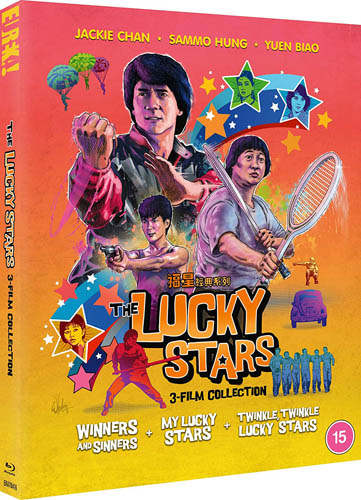
I remember very well when I saw my first Lucky Star film. It was in the late ’80s when I was just discovering Jackie Chan and hiring out all the films I could find of his. Most of them I really liked, but My Lucky Stars was a big disappointment because, even though Chan was credited as being the star, for much of the time he was offscreen and lots of time was taken up by the antics of a bunch of rather unfunny comedians which sometimes had an unpleasant sexual harassment element to it. Twinkle Twinkle, Lucky Stars I liked slightly more because at least it had more action, but Winners And Sinners I didn’t even bother seeing until a year or so later. Since then I’ve seen the films sporadically, three or four times each, and each time I enjoyed them slightly more, being for a start more acceptive of the fact that they are really vehicles for Sammo Hung and four comedian buddies [who remain mostly the same though John Shum was replaced by Eric Tsang for the second and third films and Charlie Chin visibly handed over the reins to Michael Miu for the third], with Chan being more of a guest star. But those acres of so-called comedy still had areas that were a slog to get through, meaning that I haven’t entirely been able to decide how I feel about these. Some of the slapstick comedy and sight gags worked, but it was obvious that there was also much wordplay which didn’t come off at all in the English dubs and would only be understood by Chinese audiences. Well, it had been about ten years since my last viewings, so I was more then eager to watch through Eureka Entertainment’s set [with Eureka and 88 Films both treating us to lots of Hong Kong cinema, it’s currently a great time for fans] and look at the films critically.
WINNERS AND SINNERS [1983]
AKA QI MOU MIAO JI: WU FU XING, INTELLIGENCE SCHEME: FIVE LUCKY STARS
RUNNING TIME: 108 mins
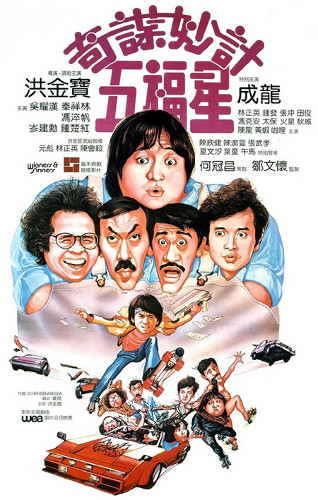
Petty criminals Teapot, Curly, Exhaust Pipe, Vaseline and Rookie all become friends in prison. They’re released exactly the same time as the crime boss Jack Tar. Once outside, they form the Five Stars Cleaning Co. with Curly’s sister Shirley whom they all lust after, while Jack commences work on his next criminal project: trading counterfeit US and Hong Kong currency with an American crime boss. CID07 0f the police is on Jack’s trail and runs into Teapot during an attempted robbery. Teapot helps CID07 deal with the robbers, but this only the beginning as the Lucky Stars become entangled with CID07’s quarry….

Winners And Sinners is a winner as long as you remember that it’s a comedy first and an action movie second. There’s a lot of genuine charm to it which the two sequels have far less if, and a surprising amount of the humour works, far more than I remembered, as long as you don’t require sophistication. Exhaust Pipe reads a book on how to become invisible and is noticed doing this by the others. After he’s done some chants, he takes off his clothes [because he’d still be visible if he had them on] and, convinced that he’s now invisible, enters the room where the others are, stands in the way of the TV that they’re watching, and throws some hits. They clearly see him but pretend that they don’t. Richard Ng, perhaps the most likeable of the group after Sammo Hung, performs this perfectly without going over the top, the staging is good, and we’re laughing or at least smiling until things turn a bit sour when Exhaust Pipe goes upstairs to Shirley to leer at her in the bath, though it’s not that bad because Shirley clearly knows what he’s doing and the scene finishes with a typical appearance from Wu Ma who only has to do his usual reaction thing to make us chuckle. It’s like this most of the way through, simple gags that children as well as adults will probably laugh at, even if things never quite get hilarious. Sadly an element of sexual harassment will be expanded on in the sequels. The gang are usually fun to spend time though unless you’re really just watching these for the action, which is perhaps just as well as the action is sporadic in this rather long [for a comedy] film until the final half an hour. Jackie Chan comes and goes in the first half then disappears until the very end because he was actually shooting The Protector at night and this during the day, sometimes not sleeping a wink. The plot relies on a series of rather hard to swallow coincidences, but the overall structure and pacing are the most even out of the three films.
Our five are introduced in five quite amusing vignettes. Teapot is a burglar and is spotted during his latest robbery attempt so he flees and tries another house. He’s surprised by a birthday party meant for somebody else and a girl pulls his mask off and cries, “You’re not Sammo Hung”! after which he accidentally ziplines right into the back of a police van. Curly is seen speaking at two different protests, clearly somebody who just shouts off about whatever bothers him at the time, before somebody saying that the audience can destroy the factory behind him leads to the cops turning up. Exhaust Pipe breaks into a car while pretending to wash it, then tries another one but is surprised by the owner with a gun and handcuffs. Vaseline is robbing jewelry stores of watches using a very strange method until some more robbers turn up at his latest one and he faints. And Rookie – well, we aren’t told what he did. The five become close friends in prison and when released take a minibus [where they scare the rude driver by telling each other of what they did to other bus drivers] to the house of Curly’s sister Shirley. All except Curly and Teapot visibly lust after her on sight and vie for getting close to her. It’s uncomfortable, but it’s nothing compared with the sequels. The would-be slick Vaseline comes up with a plan for him to be left alone with Shirley, but it’s the rather sweet Teapot who ends up spending time with her. As he says, “Aside from being healthy, smart, kind-hearted, hardworking, respectful and honest I have hardly any other qualifications”. They’re quite cute together and it’s a shame that their romance soon gets put on the back seat, though things remain leisurely for a while, time spent getting to know the main characters and even lingering on a street musical performance, while the good guys and bad guys element is cut to every now and again but isn’t the main focus.
Jack’s the main villain and has a daughter too who seems like she’s going to play a larger part in the proceedings but fails to do so, but then there’s also this other crime boss, Tar, who’s also interested in counterfeit money. Chan as CID07 is introduced beating the crap out of a suspect which is surprising, though when you see Chan doing this one tends to assume that his victim is totally deserving of what he’s receiving, and when his superior informs him that he actually beat up the wrong person, he goes back into the prison cell and receives a beating in turn. Unlike Ka-Kui, he’s something of an idiot and the loose cannon aspect is played more for laughs. The Police Story hero would never throw away a small boy’s lollipop before the poor kid had eaten any of it! CID07 first plays a part in the lives of the Lucky Stars when he fights some robbers and Teapot helps out. It’s the first piece of martial artistry in the film and it probably makes many Hong Kong movie fans cheer to see Chan and Hung fighting side by side for the first time, but after under a minute of incredible combining of athleticism, force and skill, it ends, leaving us feeling a bit disappointed. Soon after this Jack sends his chauffeur to do the exchange at a skating competition, but the chauffeur’s insecure attitude attracts the attention of two muggers who steal the briefcase containing the counterfeit US money and take off. During the ensuring chase the case accidentally ends up in the Five Stars Cleaning Co. van, though none of them notice so they don’t know that they’re in danger.
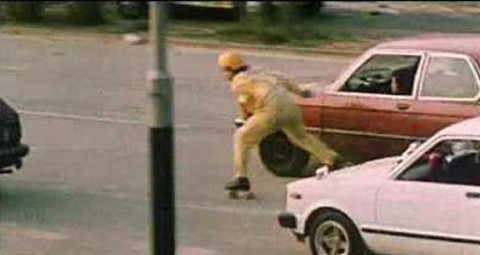
Jack hosts a party at his mansion which Teapot and his friends just happen to be cleaning which is hard to swallow, but never mind. Hoping to expand their business with the wealthy guests, they gatecrash the party. Up to now the comedy and the action have been separate, but now the two join together nicely, and soon even Curly, Exhaust Pipe, Vaseline and Rookie have to fight off bad guys despite not knowing much in the way of martial arts, while Hung dominates the finale despite not getting anyone to face off with individually, even though Dick Wei is one of his opponents. Cherie Chung also gets to do some dangerous falls. Of course the section Winners And Sinners is probably best known for is right in the middle. CID07 enters a roller skating competition and does some feats which make the similar scene in The Big Brawl seem dull by comparison, as if Chan looked at it and said to himself, “I can do better than that”. Then CID07 spots the attempted taking of the briefcase and chases his quarry by roller skate and motorbike, the highlights being him roller skating under a lorry, over a car, lying down in the middle of the road so that a car just misses driving on him, and jumping onto a bike backwards. There are more cuts than usual in these moments, showing that some of it was edited together from individual stunts, and it’s possible that doubles are in a few shots, but it’s still jaw-dropping stuff that would have been hard to find in a Western film of the time, let alone now when CGI has largely replaced the need for real stunts so that excitement is seriously diminished. The chase finishes with an epic pile-up as car after car crashes into each other, all caused by CID07 who’s demoted to traffic cop for his troubles.
Chan also get to fight Yuen Biao in a scene that seems to be just plonked in there. The two get to it for about half a minute, then stop and become friends. Again, we feel let down. But we don’t feel too let down because we’re still being thoroughly entertained by this film. It’s full of quirky little details, such as Jack having his shoe wiped by an aide as soon as he’s kicked somebody, and even jibes at traditional martial arts like mockery of stances, dismissive talk of a demonstration while the famous Wong Fei Hung theme plays, and a hilariously ill-fated jump onto a piano. I probably ought to remind first-time viewers that this is a film where two of our heroes see a [second] pretty lady and talk about “copping a feel” before trying to do this. The way the others bully Teapot, notably during a montage, isn’t too funny either though Teapot seems happy to take it. Charlie Chin’s Vaseline is a tad repulsive at times, but this may be intentional with him parodying his heart-throb image, and the film does benefit from having him, Hung, Ng and Stanley Fung hold back on the mugging while only John Sham becomes maniacal, James Tien as Jack also getting to chew the scenery. Lam Ching-Ying has a funny cameo, Moon Lee has a nice cameo, and several other names of the time also appear, while Hung, clearly really enjoying making this one, employs a few more interesting camera angles than usual as well a fair bit of slow motion and beginning the tradition of Chan’s stunts sometimes being shown more than once. His Carry On Pickpocket the previous year laid the groundwork in melding comedy and martial arts in a modern setting, but Winners And Sinners did more with it and overall is a more important and even groundbreaking film than it’s often given credit for. It’s the least impressive out of the Lucky Star films in terms of martial arts, but it’s the best all-round film. When the end credits come up with the reprise of the theme song that celebrates being happy, it’s hard not to feel happy too.
Rating: 









SPECIAL FEATURES
Brand new 4K restoration
The days of yellow emphasis and lousy black crush are well gone. This is a very good presentation with mostly even grain, and a very clean picture with nary a blemish. The colours do seem ever so slightly faded, but I’m sure that this wasn’t intentional and just a fault with the original print.
Cantonese audio track [original mono presentation]
Newly translated English subtitles
These are considerably better than previous ones and even allow us to understand some of the language-centred humour.
Optional English dubbed audio track
Brand new feature length audio commentary by Asian film expert Frank Djeng [NY Asian Film Festival]
This is an excellent audio commentary, absolutely packed with information and appreciation, so much so that Djeng apologises for talking too fast, though he doesn’t need to. We learn that the names of the cast members don’t come up at the beginning because original cinema prints had them burned in instead during their first onscreen appearance, where two stunts went badly wrong, and that Chan was a naughty boy during filming and his wife found out. I also now know how to pronounce Ng, for which I’m grateful. Djeng also explains some humour that only Chinese audiences would get such as misplaced usages of slang, and seems to know where every single scene was shot. Biographies are kept mercifully short. Overall this is a fine example of how to do this sort of thing.
Sammo Hung on Winners And Sinners [6 mins]
Also on the old Dragon Dynasty Blu-ray on Region A, this brief piece, which looks like an edited down version of a longer interview, may have originated on Chinese TV. Hung describes the programme that inspired Winners And Sinners in more detail, seems slightly evasive when discussing Chan, and appears befuddled by the west’s fascination with super heroes seeing as Hong Kong folk often perform super heroic feats for real.
Teapot Tango: Interview with director and star Sammo Hung [13 mins]
From the Region 2 Hong Kong Legends DVD come this and the following featurette, but not, for obvious reasons, the Bey Logan audio commentary which has been replaced by the one by Djeng. This interview, which has Hung go back and forth from English to Cantonese, comes across as an expanded version of the above one, covering some of the same things, but also going into the characters of the Lucky Stars, why he used more close-ups than was generally done in action at the time, and why he loves Charlie Chaplin.
The Man Behind the Legend: Interview with director and star Sammo Hung [20 mins]
This rather fluffy piece begins with the same music that ended the previous one has several Hung collaborators old and new discuss him, mostly about how nice he is. We hear how he’s always buying food for his co-stars, how he’ll stay up all night but remain calm to get fight moves right, and what Richard Norton in Twinkle Twinkle Lucky Stars had to go through when doing his final fight scene in that film; he had to do eighteen-hour days, seven days a week, for five and a half weeks! I could have done with more stuff like this and less “He’s amazing” type stuff, but this is still a nice watch.
Lucky Stars Live Performance [8 mins]
Presumably taken from Chinese TV and a bit blurry, this sees the Lucky Stars troupe of My Lucky Stars [so no Shum with Eric Tsang in his place] mocking each other when deciding who should MC, then performing a song set to the tune of ‘Puttin’ On The Ritz’ with some characteristic leaps and rolls from Chan, Hung and Baio, before Sibelle Hu appears to sing another song and get hit on by most of the others. What a nice addition this is, a real treat for fans.
Outtakes [4 mins]
The mocking presenter is a bit annoying, especially seeing how he seems to disrespect the incredibly hard work done by Chan, Hung, Baio and the stunt team, but these outtakes are still great to see, especially Chan screwing up his roller skate through a burning hoop, and the not too impressive first incarnation of the postman.
Alternate Japanese End Credits [3 mins]
I would have thought that these would have been almost the same as the above, but they’re mostly different and not as interesting. Still, it’s weird how films with Chan in that were directed by Hung didn’t tend to get outtakes anywhere except in Japan.
Trailers and TV spots:
-Hong Kong Teaser [42 seconds)
-Hong Kong Theatrical Trailer (4 mins]
-English Theatrical Trailer (2 mins]
-Japanese TV Spot [15 seconds]
-Japanese Theatrical Trailer [2 mins]
MY LUCKY STARS
AKA FUK SING GO JIU, LUCKY STARS SHINE HIGHEST AND BRIGHTEST
RUNNING TIME: 96 mins/88 mins
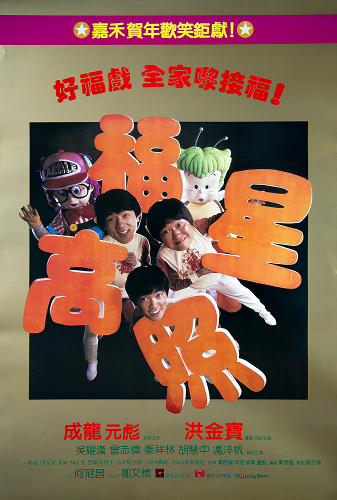
A corrupt Hong Kong cop flees to Tokyo to join his fellow mobsters. Two good cops, Muscle and Ricky, travel there to apprehend him and uncover the mobsters’ lair, but Ricky is kidnapped. Muscle calls his boss Superintendent Walter So to send help; since the mobsters already have information on the Hong Kong police officers, Muscle asks that his childhood friends Francolin Green, Sandy, American Ginseng, Monk Fruit and Rawhide assist. He agrees and collects the five friends, who are all either petty criminals or low-wage workers. They refuse to aid the police, but So blackmails them into helping, the five suddenly more keen when female rookie policewoman Barbara Wu aka Empress Flower presents herself to help….
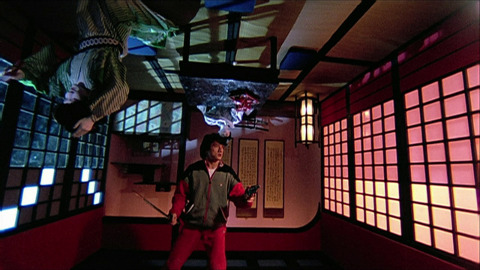
My Lucky Stars doesn’t really follow on from Winners And Sinners. Everyone has different names and, instead of meeting in prison then forming a cleaning company outside, the Lucky Stars are childhood friends [the English dub calls them “the old orphanage gang”] who’ve since gone their separate ways, and Chan’s character Muscle was once part of the group. Muscle, even though he loses his quarry near the start, is not the idiot excuse for a cop like his forbearer. Hung’s character, now called Francolin Green, is not the victim of the group but is now the leader, as befitting his Big Brother status in the Seven Little Fortunes, the Peking Opera group which he, Chan and Yuen Biao had been members of when they were children and which the Lucky Stars seem to be deliberately trying to evoke. At the end of the previous adventure, one character was revealed as an undercover policeman, but he’s now back to being one of the Lucky Stars. And John Sham’s Curly is replaced by Eric Tsang’s Monk Fruit. So, while this film can still be considered as a sort of sequel, it’s really more of a reboot, with Hung, the guiding figure in these films, rejigging things in an attempt to keep things fresh and also improve them, though whether he succeeded in achieving the latter is debatable. This one seems to be generally more popular and better regarded than the first, but I honestly fail to see why except for Chan being given more action to do and there being more martial arts in general. Both of those are, I suppose, good enough reasons, but for me My Lucky Stars suffers from very awkward pacing which basically has a nearly action-less middle hour considering almost entirely of comedy bookended by admittedly amazing thrills. And the humour is more spotty this time around, with a nasty emphasis of sexual harassment that becomes borderline sadistic.
The beginning is deceptive, giving the impression that we’re going to be watching an thrill-packed film, but probably helped give Chan the idea for beginning Police Story in the incredibly spectacular way that he did; the music by Siu-Tin Lai and Siu-Lam Tang [taking over from Chris Bibalba and Frankie Chan] is even similar with a main theme that’s virtually a forerunner of his theme in that series. Muscle and Ricky, the latter played by Yuen Baio, are pursuing a gangster in Tokyo’s underground. He flees out of a train station and warns the person sent to meet him, after which they drive off in the latter’s car. Rather than running round the car to get in the driver’s seat, he rolls on the car’s bonnet to do so, a minor but representative example of the freneticism of Hong Kong movie action. The two cops commandeer another car and speed off in pursuit, jumping over some fences in an attempt to catch up, but this isn’t good enough so they move up right behind a lorry, hit the back so it opens up to reveal a ramp, then drive up the ramp and over three other vehicles to land back on the road further up ahead. The chase becomes on foot and goes into a fairground, and Muscle can’t see where the crooks are, so what does he do? He climbs up the supporting structure of a Ferris wheel so he can spot him, as you do. Ricky also climbs up quite high though does it by acrobatics, but we focus more on Muscle as he spots the guy and slides and jumps back down, even though we still get to see Baio do a huge leap onto an ice rink. Not only are we given yet more proof of the insanity of these stars, we see once again how darn easy they make doing this sort of thing look. Eventually our two cops catch up with the villains but then some ninja [oh yes!] turn up to attack them. Ricky is carried off into a ghost house and Muscle delayed by a man who gets him to photograph him and his wife. He has to ring his boss Walter So, who doesn’t know which of his many phones is ringing, and it’s on to the comedy.
Again, our five are introduced in separate scenes. Francolin Green is released from a prison where everyone is fighting over pictures of female film stars. He tries to break into the first car that he sees and the army automatically shows up as well as James Tien in a film that has so many cast members from the previous one return in different roles. Walter tells him that he needs to borrow his “criminal expertise” and also needs his buddies. Yankee Ginseng, formerly known as Vaseline, now steals jewels rather than watches but this time ends up really hurting someone. Rawhide, the new version of Rookie, has switched from robbing cars to robbing people at knife point, but when posing as a dentist because he hears a really rich guy [Bolo Yueng!] is coming in, the man mistakes him for the person his wife has been having an affair with in a pretty funny scene that descends into chaos. Monk Fruit is also in prison, getting away with lifting the same box repeatedly and making it look like he’s hard at work. And Big Remmania, this film’s version of Exhaust Pipe, is in an asylum and trying his hand at telekinesis, Richard Ng virtually replaying his cameo role in Wheels On Meals. They travel to meet So on another mini-bus so we get another mini-bus gag, but this one is dragged out and involves some racial humour that non-Chinese probably wouldn’t understand, so it’s no wonder that it was cut from of the export version. So shows them a news report which claims that the gang is responsible for a major robbery, so they have to comply, though the delectable Empress Flower provides compensation. But things drag for a considerable time as the gang harass Barbara, travel to Japan, and eventually infiltrate the gang who may have Ricky, while fewer of the jokes seem to land. But at least Chan eventually reappears to deliver some cool blows and leaps.

The lengthy final section makes up for the preceding issues as Chan enters the haunted house and has to battle a variety of opponents in a variety of settings including even an upside down room and finally the villain’s Bond-like underground lair where we see multiple face-offs involving Chan [against Wei for the first of five times], Hung, Biao and even Sibelle Hu. The latter gets to fight Michiko Nishiwaki who in her debut already has a powerful presence as one of the Japanese gang members. Hu just about gets away with not knowing martial arts, as does Baio’s opponent Lam Ching Ying. Of course some of the performers do some dangerous things, notably Lau Kar Wing who does a back flip and crashes into a glass table. Still, even if all the participants have done better, it all makes for a fine climax which makes up for the bad taste left by some of what’s come before. The lower tone of some of the humour reaches almost rock bottom when the group torments Empress Flower, especially when they play a game so that each one of them is tied up with her. If you’re familiar with my reviews you’ll know that I am defiantly anti-PC and have no problem with, say, Carry On films, but these scenes bothered me even when I first saw them. There’s a line between to being typical randy guys who are desperate to get laid, and this kind of genuinely nasty abuse which we’re intended to find it funny. This version even has jaw-dropping mentions of an intention to “rape” and “gang rape” which were not in the earlier editions released in the UK. Of course I’m certainly not saying that the film should be suppressed because of all this; cancel culture is something that I consider to be very dangerous and one of the blights of our age. I’m personally very bothered by these scenes, but people should still have the freedom to watch them.
There are thankfully some genuinely funny moments to compensate, if often stupid, like when paper from a telex machine is mistaken for hand drying tissue. The comedic highlight [some might say lowlight] is when the gang all sit down in a Japanese restaurant and the only way they can communicate with the waiter is to act out what they want to order. None of them seem to want anything simple, either, so watching them try to act out something like spaghetti carbonara or a club sandwich is quite something. Then it finally gets to Monk Fruit, who just asks for a sausage while pointing to his crotch. He ends up with a walnut. More could have been done with the premise of Rawhide thinking he knows ESP; it would have been a great thing to have reoccurring more times than it did. And there are occasions when the Lucky Star’s interplay falls a bit flat. Some of this might be due to Tsang, whose mugging gets tiresome. As before, Hung gives himself the most screen time, though he doesn’t get to romance the leading lady this time; it does seem like this is going to happen in a scene where she compliments him, but it seems that she’s doing this just to get him to do the right thing. But Hung does ensure that this adopts a different look from the previous film, seemingly going to a lot of trouble to make it very bright visually, with colourful settings and costumes. Despite having some major issues, there’s still much to like in this very uneven but sporadically impressive effort.
Rating: 









SPECIAL FEATURES
Brand new 4K restoration
The much more vibrant look to this one really makes it come alive on Blu-ray, especially during the fun house section where you can truly appreciate the sets and use of colour. It’s the sharpest looking one too, though without any digital sharpening that I could see; thankfully that seems to be done less and less of late. Blacks are deep and devoid of crush, skin tones look accurate. The best looking Jackie Chan film on Blu-ray after Wheels On Meals [which was also from Eureka surprise surprise]
Hong Kong version with Cantonese audio track [original mono presentation]
Newly translated English subtitles
International version with English dubbed audio track [88 mins]
Despite the English dub, which as usual is reasonable though no more, I think that this version works slightly better. The removal of that endless bus gag speeds things up a little, the Lucky Stars no longer consider raping Wu due to some of the dialogue being altered, and even the replacement of a song during one scene with different instrumental backing is preferable. The replacement of a walnut by a frog in the restaurant scene is bizarre though, it’s a less funny climax to the joke. All previous UK versions cut a few seconds of car breaking, but that’s now back in because that was removed by the BBFC, not the international distributors.
Brand new feature length audio commentary by Asian film expert Frank Djeng [NY Asian Film Festival]
Djeng’s second track is just as good as his first, even though personally I don’t like the film as much as he does. The only repetition is when he briefly relates the amusing story of when he met Stanley Fung again. He says that this is actually the second time he’s done a talk track for this, the first being at a festival with Scott Aitkins. Djeng informs us that the names of the Lucky Stars [at least in this version; other, earlier ones gave them different names] are names of Chinese herbal medicines, we also learn that Tseng’s replacing of Sham actually took place three weeks into shooting and required extensive rewriting on set, and the name of the anime character that Chan dresses up as. A curious fact is that Comic-Con audiences don’t like films with guns. Regarding the sexual harassment, Djeng just seems to shrug his shoulders and say that, in 1985, people didn’t think the way they do now.
Interview with Michiko Nishiwaki [20 mins]
Both this and the following interview are from the Hong Kong Legends DVD. I still own that, and may possibly keep it, as well as my ones of Winners And Sinners and Twinkle Twinkle, Lucky Stars, for the Bey Logan commentary. This chat with the awesome Nishiwaki is very good indeed as she details her martial arts and body building background before detailing her time on My Lucky Stars, from which she still has a cut. She says how Chan, Hung and Baio would always look at each other and laugh, how one bit of Baio doubling Wei took a whopping one hundred takes, and expresses disappointment at not getting to fight Hung – instead, he just knocks her out with one punch. She also says that it was Yuen Kwai doubling Lau Kar Wing, not Wing himself, who did the table stunt. Nishiwaki seems like a real fun person and it’s a shame that she faded from the limelight after a few years.
Clown Prince: Interview with Sammo Hung [18 mins]
Once again Hung details his inspiration for Winners And Sinners before going into My Lucky Stars. My jaw almost droppedd when he said that the whole film, including pre-production, only took three months to make! Other topics include Hong Kong stunt work and how Hu had bruises all up her arm doing her action but didn’t complain. Hung seems the most at ease in this particular interview.
Alternate Japanese End Credits [2 mins]
For some reason these are before the outtakes rather than after as with Winners And Sinners, but anyway they’re better and more numerous, and include the table crash. Oh why oh why weren’t these on the Hong Kong and export versions?
Music Video [2 mins]
The same song that’s heard over the Japanese end credits is seen being performed here by lots of white-clad singers while stern-looking judges sit at a round table. I’d imagine that this is taken from Japanese TV. The picture quality isn’t great, but I reckon few will complain.
Outtakes [9 mins]
These are probably best watched after the Japanese end credits, since these nine minutes are basically an extended version of them. We see some of the same mistakes, some of which are dwelt on for longer, plus other gaffs and the same voiceover mockery.
Trailers:
-Hong Kong Theatrical Trailer [4 mins]
-English Theatrical Trailer [2 mins]
-Japanese Theatrical Trailer [2 mins]
TWINKLE TWINKLE, LUCKY STARS
AKA XIA RI FU XING, SUMMER SUN, LUCKY STARS
RUNNING TIME: 96 mins/109 mins
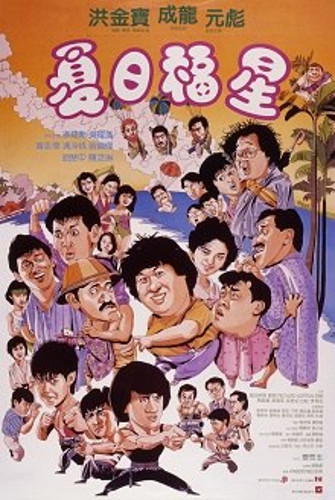
The Lucky Stars go on holiday to Thailand. Meanwhile Barbara Wu receives a request from her boss to get information from an informant, and gets Francolin to help her, but said informant is killed by some assassins, though not before putting incriminating evidence in the mail to his actress friend Wang Yi-Chin. The Lucky Stars have to return to Hong Kong when Francolin and Wu are attacked, and have Yi move in with them to help out, though of course they’re more interested in her than the case. At the same time Muscles and his new partner are protecting a drug lord who’s being targeted by the same gang….

Quite frankly, I found it hard to summarise the first third of Twinkle Twinkle Lucky Stars because its plot is rather messy, showing distinct signs of having been cobbled together by screenwriter Barry Wong who also co-wrote the first two films with Sammo Hung. However, it’s probably the most popular out of the three because, while the others were about three-quarters comedy and one-quarter action, this one makes the balance more even and is therefore the best watch for those who are chiefly interested in the action. And what action it is, with several amazing martial arts encounters which are up there with similar scenes in the more celebrated likes of Police Story and Dragons Forever. It’s also more brutal than in the other two films, with more blood, bruising and Hung even punching a woman in the crotch, but this doesn’t deter from the incredible ballet that we’re treated to. These scenes are dotted more evenly throughout the film too, meaning that the pacing is much better than that of My Lucky Stars, though confusion with some story elements mean that we could have done with an extra scene or two clarifying matters. As for the humour, it’s even more weighed towards the sexual and features even more of our supposedly hilarious guys attempting to pull women, which usually means figuring out a way to grope them so that it seems like a normal turn of events, and which considerably reduces our sympathy for them. There’s an element of meanness in Rawhide’s bullying and violent treatment of Monk Fruit too; it was in the prior film but is even more pronounced here. Jokes that are actually funny are even more thin on the ground, though the odd goodie does fortunately still come along.
An introduction tells us about and shows us some important 20th Century events, before going to say,“However, none of these have anything to do with the story that follows”. We rejoin the Lucky Stars waking up, cue for a nice sight gag of an alarm going off but it not being from the large clock we expect but a tiny clock that’s behind it, some sleepy pissing in a cupboard [folks, it’s not as unbelievable as you may think], and some spraying with Pepsi which doesn’t entirely make sense to these western eyes even with Eureka’s newly translated subtitles which are probably the most accurate we’ve seen. Nice to see Barbara elbowing American Ginseng in the stomach when he tries it on. The gang go off on holiday to Thailand, with one major difference; American Ginseng decides to stay at home for some reason, so he sends his brother in his place, though frankly he needn’t have bothered, because Michael Mui Kiu-Wai has next to no charisma and just seems to blend into the crowd except for a few crass pulling attempts. There’s a brief bus ride which disappointingly doesn’t end up with another gag involving the driver as in the previous two films, and then the group are pursuing and harassing girls as usual, horribly groping some while at dinner and then digging a tunnel under them on the beach. I bet that any experienced reader tiring of my usual whinging about Woke will be surprised at my stance here, but I’m sorry; these guys are horrible sex pests. At least Rawhide gets to tell a pretty funny joke which I’ve also told to people who have responded with laughter, hopefully at the joke and not my stupidity in telling it [it requires some acting out]. And Wu Ma gets one of his characteristically funny appearances, slightly larger than his one in Winners And Sinners; this guy has such a great face and is so expressive without having to do much. He plays a magician who teaches American Ginseng some magic in order to make women fall for him, though the resulting tomfoolery isn’t as funny as it should be.
While all this is going on, there’s some more serious man-woman stuff going on as Barbara apologises to Francolin for leading him on in Japan and tells him she doesn’t love him, but soon after appeals to his romantic senses a second time so he helps her in her mission. Suddenly we’re in action mode as three parasailors show up in the air above the beach that the Lucky Stars have been making themselves a nuisance on, one of them no less than a bazooka-wielding Richard Norton, best known to martial arts movie lovers as Cynthia Rockrock’s companion in several films, though he did some memorable Hong Kong work too. One blast and their quarry is dead, but Barbara and Francolin come across him as he dying, and he tells them about this incriminating letter he sent to a friend. Now I would have thought he’d have been better off sending the letter to the police rather than involving a lady friend in all this. And I wouldn’t have thought that some assassins would have been sent to kill Yi and Francolin as quickly as they are seeing as the two weren’t actually seen finding him. The gang return to Hong Kong where Wu and Ricky go looking for Yi who’s going to be the recipient of the letter. She lives with a nutter called Wormgrass which sees John Sham return to the series, though he’s more annoying than funny. But of course this and the other Lucky Stars sheltering Yi makes them targets. Now where’s Muscle in all this? He’s guarding another crook against murder attempts by the same gang that are after the Lucky Stars, though sometimes his partner is Andy Lau [not given a proper name like several other of the cast members] and sometimes it’s Yuen Baio again. Chan actually allows himself to easily beaten by Norton after a lengthy foot chase, but was supposed to get his own back in the climax. However, he damaged his back so Hung had to take over.
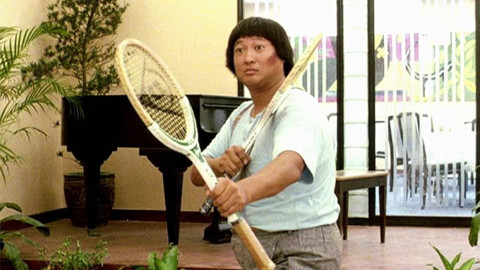
After the sudden attack on Francolin and Barbara by knife-wielding women [a couple of who seem to be played by men], we switch to a boat where Chan, Biao and Lau get their introduction. They surprise a large group of bad guys with cases of drugs, not to mention the cases of Pepsi near by; the product placement is strong in this one. The pointing out of some explosives means that they can’t just shoot all the baddies dead, so they have to fight their many opponents. Lau wasn’t a huge purveyor of martial arts skills and became known more for acting and singing than for fighting, but he acquits himself well fighting alongside Chan and Biao in what is the longest piece of fighting action of the series, full of gasp-inducing leaps, falls and techniques. Chasing by bike and car and foot, gunplay and assassinations keep the pace of this one moving fast, though the action only really mixes with the humour when Yi enters a room where a sniper is about to kill someone and pretends that she’s blind, and even here tension rather than silliness dominates, us being quite fearful that she’ll give herself away in what is by far the most suspenseful scene that’s in the three films. Hung clearly aimed to create a harder-edged film here and succeeded, though this seeps over into areas where it doesn’t need to. But such problems are forgiven when you get a final reel of such astounding martial artistry and choreography as Hung has to fight Norton than Yasuaki Kurata while Biao, whose role in this one is a bit larger, is left to deal with Chung Fat, sporting a very fake moustache. The bit when Hung picks up some tennis rackets so he can match the seis of Kurata is an almost cheer-worthy moment and one of Hung’s most memorable. Chan of course shines in all three of these films, but Hung is allowed to match him in Winners And Sinners and this one, and we can really marvel at how somebody so large can have so much agility and precision. His action directing almost hits a peak too, with more use of closeups without degenerating into the mess of much modern fight choreography.
But the storyline is all over the place and virtually resolves itself into a series of set pieces with little connection. A sequence in a martial arts school features the second screen appearance of the incredible Michelle Yeoh who briefly gets to duel with Hung, but the weird re-enactment of a portion of Romeo And Juliet that follows isn’t particularly funny either despite its length. The funniest bits tend to be very brief, like a decent bit of Three Stooges imitation and a brilliant gag when somebody walks right into a painting, It’s just such a shame that the tormenting of a woman – this time played by Rosamund Kwan whose nipples you can make out when she’s submerged in a bath – in a house by our five horny guys is repeated here, and much of it taking place in exactly the same bedroom set too. Comedy is full of men chasing women and often getting foiled and even punished for their efforts, but the behaviour of this lot is abominable, even though these films were mega-hits at the Hong Kong box office. And I don’t know why Francolin is involved in this stuff, because it lessens considerably our belief in his sincerity with Barbara. But then the audio commentary tells us that this film, which looks cheaper and tattier than the others, was made in even more of a hurry than My Lucky Stars and, bearing in mind Hong Kong movie scripts often began with an outline which was then filled out during the shooting process, this being no exception, maybe we ought to be kind with regard to some aspects of Twinkle Twinkle Lucky Stars. It’s still a good showcase for the incredible energy, fearlessness and invention of Hong Kong cinema of the period, a period when it was one of the most exciting in the world. It ends wonderfully with not just all its characters but a good number of other names of the time all emerging from a lift to crowd onto the screen and mingle with each other.
Rating: 









SPECIAL FEATURES
Brand new 4K restoration
After about half an hour in pretty Thailand locations the film switches to generic studio sets and constantly becomes less appealing visually, though this release still probably looks better than the cinema version did. Colours are very natural and hue balance is very even. Of course the huge increase in detail over the DVD version means that one can sometimes tell when a stunt person is doing some doubling!
Hong Kong version with Cantonese audio track [original mono presentation]
Newly translated English subtitles
Extended Taiwanese version [109 mins]
I’m going to be honest and admit that, due to time constraints, I mostly just flipped through this version which, unreleased in the west up to now, runs eleven minutes longer than the regular cut. Djeng’s commentary sais that there was no extra fight footage. Instead, it’s small bits of dialogue and some extra comedy beats. We could have done without more sexual harassment on the mini-bus of girls the Lucky Stars have just met, but the opening, with more sleepwalking and a longer introduction to the new Lucky Star, is rather better, while Francolin and Barbara get one extra scene which is short but nice and adds to the subplot of these two characters. After this, it seemed to me that the rest of the extra material was spread out over lots of scenes, which were cut slower and had a few more lines coming from some people. I think I’ll stick with the original version even though I have a tendency to prefer longer cuts of films, but kudos to Eureka for including it anyway.
Optional English dubbed audio track
The English dub on this really is quite good, on a par with Dragons Are Forever.
Brand new feature length audio commentary by Asian film expert Frank Djeng [NY Asian Film Festival]
Djeng’s third track begins with him saying what he’s done a third time which is rather redundant since I reckon most buyers would listen to these commentaries in order, and oddly omits the detail about Chan’s injury and the subsequent fight switching, but he’s still continually telling us material of interest. We’re reminded of the nature of Hong Kong filmmaking when he tells us that five and a half weeks was spent on the final fight, informs us how to tell when the film is being shot in a set [it’s easy really], and names all of the people coming out of that lift at the end. Djeng also remarks on the staging and filming of the fights throughout all three of these tracks, and was clearly the man to do these as he’s a big fan of these films while still feeling able to point out a few flaws.
A Lifetime of Laughter – Interview with actor Richard Ng [21 mins]
You can just about detect a rather posh English accent mixed in with Ng’s more expected Cantonese one in this interview. He was sent to the UK to be educated before returning to Hong Kong after fifteen years. He tells of how there was a great deal of mucking about and improvisation on the film sets [hardly surprising], and gives honest opinions on his co-stars and what they brought to the table. Try and guess which one “was a volatile person, every one stayed away from him” and which one was “one big happy-go-lucky child”. Only his mention of telling Chan that his future was in comedy sounds a bit off – he’d already done a lot of comedy by 1983.
Gentleman Warrior – Interview with actor Richard Norton [32 mins]
As with the above, this is from the Hong Kong Legends DVD. This is the lengthiest of all the interviews in this set, though most of the material about Twinkle Twinkle, Lucky Stars was in The Man Behind the Legend on the Winners And Sinners disc. Norton details his early interest in martial arts including much time spent with the one and only Chuck Norris, his fascinating period as a bouncer for some very big pop names indeed, and how he tried some subtle acting in Mr. Nice Guy only to be reminded that subtle acting wasn’t the name of the game in these films.
Outtakes [3 mins]
It’s disappointing that there are far less action mistakes for this one, considering the larger amount of action in the film. Thankgfully there’s no voiceover with these, but words come up sometimes instead.
Trailers & TV Spots:
– Hong Kong Theatrical Trailer [3 mins]
– English Theatrical Trailer [2 mins]
– Japanese TV Spot [15 seconds]
– Japanese Theatrical Trailer [2 mins]
BOXSET SPECIAL FEATURES
A unique variant edition Limited Edition O-Card slipcase featuring new artwork by Darren Wheeling [2000 copies]
Limited Edition collector’s booklet featuring new writing by James Oliver [2000 copies]
The comedy is hit and miss in these movies but the action is incredible. Uneven but with undeniable brilliance coming along every now and again, the Lucky Stars films in a way epitomise Hong Kong cinema in its Golden Age. Eureka’s Blu-ray set more than does them justice. Recommended.


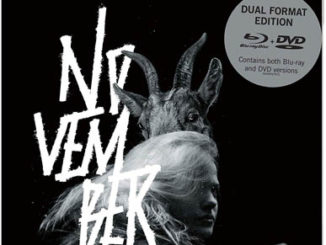
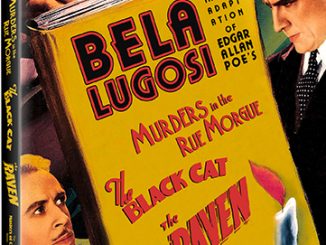
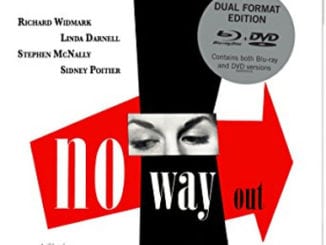
What you did was amazing. I’m a Cantonese and I’m grateful that these movies have attention oversea